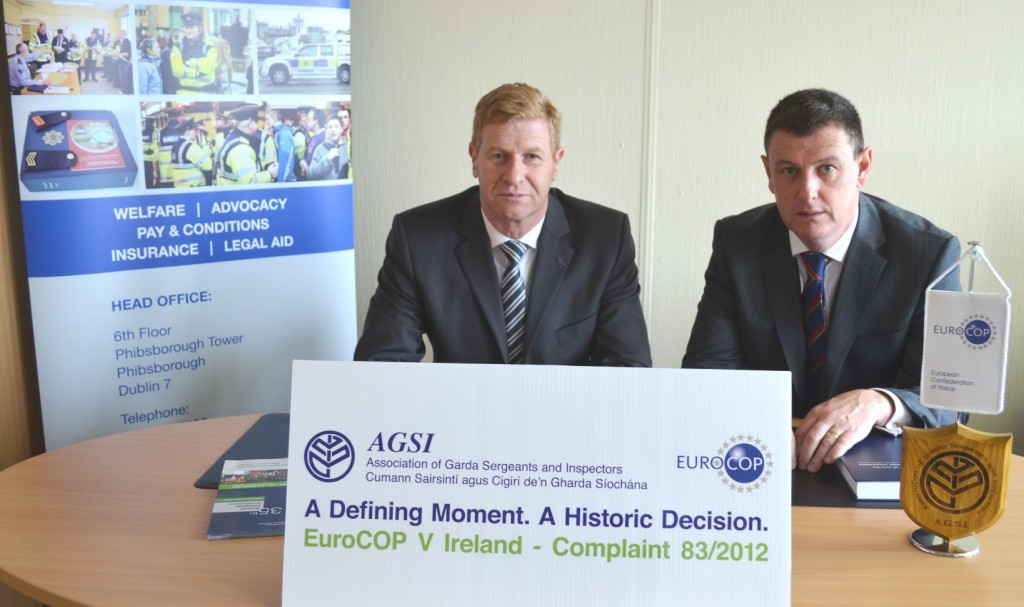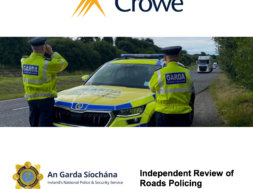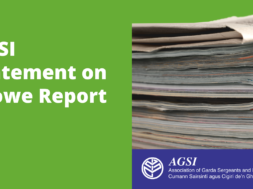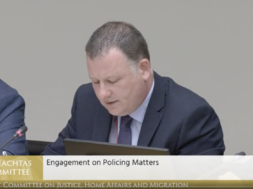European complaint against Ireland upheld
Download full decision here European Complaint 83-2012 Decision

NEWS RELEASE
The Association of Garda Sergeants & Inspectors (AGSI) has won a European case, which will see the rules in relation to trade union rights for members of An Garda Síochána being changed.
In June 2012 AGSI lodged a complaint through the European Confederation of Police (EuroCOP) against Ireland’s implementation of the European Social Charter.
The complaint alleged that it, and other police associations, did not enjoy full trade union rights in Ireland and that Articles 5, the right to organise, Article 6, the right to bargain collectively and Article 21, the right to information and consultation of the European Social Charter were violated as a result.
A 42-page decision from the adjudicating body, the European Committee of Social Rights, which is binding, sets out the framework for such a decision, and one that benefits all members of An Garda Síochána.
“A Defining Moment”
AGSI General Secretary, John Redmond who pursued the complaint on behalf of AGSI described the decision as, “a defining moment in our history and a significant decision for our future.”
Mr. Redmond pointed out that AGSI had spent many years trying to progress issues of concern through the mechanisms, which were available to it including use of the fractured Conciliation and Arbitration scheme.
“The Association had on many occasions pointed out the inadequacies of the scheme and the unfairness of its operation. These arguments were never accepted by the Departments of Justice or Finance nor indeed by Government,” says Mr. Redmond.
“AGSI was ultimately left with no alternative but to pursue the matter at a European level. This has resulted in a far-reaching and binding decision by an EU body that Ireland has erred and breached a Charter to which it had signed up to in November 2000.”
Mr. Redmond continued, “The Association hopes that it will never have to resort to using its newly acquired ‘right to strike’ in pursuit of the rights and entitlements of the Sergeants and Inspectors we represent and we now urge the Government to work quickly to agree mechanisms which will give AGSI access to the Labour Relations Commission and the Labour Court.”
EuroCOP Feedback
EUROCOP’s President, Anna Nellberg Dennis noted that, “The Committee’s conclusions are a victory not only for the Irish police, but have important impacts upon police forces across Europe. By highlighting the fundamental importance of police rights, and educating European police officers about their rights to organise and to bargain collectively, the Committee has helped us draw more attention to those Member States that are failing to adequately provide for the social rights of their police officers.”
The Decision on Collective Complaint no 83/2012
Article 5 of the European Social Charter deals with the ‘right to organise’ or the right to be a trade union. AGSI has that right already and are organised pursuant to SI 135 of 1978. But that Section also deals with umbrella organisations. So it seems that previous decisions by Minister Dermot Ahern and the late Minister Brian Lenihan and others were incorrect in preventing AGSI in becoming affiliated to ICTU.
Article 6.2 of the European Social Charter deals with the collective agreements of pay and conditions and the right to be involved in such collective decisions. AGSI broke the mould through their direct negotiations with Government vis-à-vis the Labour Relations Commission during negotiations for the Haddington Road Agreement. The decision arrived at by the European Committee of Social Rights under this Article means that the Conciliation Council in its present iteration is null and void.
Article 6.4 of the European Social Charter deals with the ‘right to collective action in the cases of conflicts of interest, including the right to strike’.
Article 21 of the European Social Charter deals with the ‘right to information and consultation’.
ENDS
Notes to Editors:
The Decision on Complaint 83/2012 – Key Takeaways
NOTE ‘The Committee’ refers to the European Committee of Social Rights – the adjudicating body.
In June 2012 the Association of Garda Sergeants and Inspectors (AGSI) lodged a ‘complaint‘ through the European Confederation of Police (EuroCOP) against Ireland’s implementation of the European Social Charter. This Charter guarantees the fundamental social and economic rights of all individuals in their daily lives. Ireland signed the Charter on 4th November 2000 and it came into force for Ireland on 1st Jan 2001.
AGSI complained that Ireland was in breach of several ‘Rights’ of citizens set out within the European Social Charter and most particularly that it does not allow AGSI to enjoy trade union rights including:
- Article 5 – The right to organise
- Article 6 – The right to bargain collectively
- Article 21 – The right to information and consultation
In short, AGSI complained that the police in Ireland are prohibited from establishing trade unions; prohibited from affiliating with national employees’ organisations (Irish Congress of Trade Unions), provided with insufficient access to pay agreement discussions, denied access to the Labour Relations Commission and the Labour Court and denied the right to take collective action.
Article 5 – The right to organise
From the outset, AGSI accepted that by being allowed to be a ‘staff association’ we have certain rights and protections and on that basis did not per se argue that the title of ‘trade union’ would confer any more rights than the title of ‘staff association’. However, the breaches of the Charter as alleged by AGSI would still be applicable.
The deliberations of the European Committee of Social Rights culminated in the decision that AGSI is, and has been, the subject of a violation of Article 5 of the Charter in that it is prohibited from joining a national employees’ organisation. (See Paragraph 123 of the Decision)
This decision confirms AGSI’s view that successive Ministers for Justice who denied AGSI its right to affiliate to the ICTU were incorrect in their decisions.
Article 6 – The right to bargain collectively
AGSI complained that as an Association representing certain members of An Garda Síochána, we were excluded from taking part in actual pay negotiations and are the subject of agreements arrived at between other trade unions and government. This was an alleged breach of Article 6.2 of the Charter.
The European Committee of Social Rights rejected Government arguments and decided that limited access to the Labour Relations Commission and Labour Court on an individual basis which, is currently available, is not the same as access to a body or group representing staff interests. Therefore, AGSI is and has been the subject of a violation of its rights under article 6.2 of the Charter.
The Committee further asserts that the Conciliation Scheme which is chaired by an appointee of the Department of Justice allows a perception to develop that the Scheme is not an unbiased negotiation body.
The Committee decided that there is a violation of Article 6.2 in that the current practices employed by Government fail to ensure sufficient access by AGSI into pay agreement discussions. (See Paragraph 186 of the Decision)
Article 6.4 of the Charter deals with the Right to Collective Action (Strike). AGSI complained that it is denied the right to take collective action as set out under the Charter. However, the Charter allows for restrictions in certain States based on arguments advanced by the State involved. (See Paragraph 221 of the Decision)
The Committee does not accept that restrictions on collective action / right to strike applied to a group as a whole is compatible with the Charter (Denmark decision 1969). Prohibition by a State on the right to strike must follow three rules:
- Must be established by law
- Must pursue a legitimate aim
- Must be objectively necessary in democratic society
The Committee found that the first two criteria are met regarding Ireland. It deliberated on the absolute prohibition on the right to strike of AGSI and considered the argument put forward by Government that Ireland’s police service could not be allowed to strike as that decision was objectively necessary to deal with the social needs of society.
The Committee ultimately found that AGSI’s rights are and had been violated under Article 6.4 of the Charter in the decision of Government to prohibit the right to strike.
Article 21 – The right to Information and Consultation
AGSI complained that its rights to information and consultation under Article 21 were breached by Ireland on an on-going basis. The Government argued to the European Committee of Social Rights that Article 21 was not ratified by Ireland in its accepting the European Social Charter and therefore AGSI cannot be heard in relation to its complaint under this Article.
The Committee accepted that Ireland made a declaration within the instrument of Ratification of the Charter that it does not consider itself bound by Article 21. As a result of that declaration, the AGSI complaint under Article 21 is not admissible.









